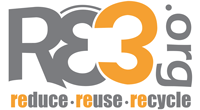 Was the CRA conference in March beneficial to me? Yes, it was.
Was the CRA conference in March beneficial to me? Yes, it was.
In the session titled “Understanding and using the climate change link” with Thornell Cheeks and Ken Mitchell I learned:
-EPA can regulate greenhouse gases via the Clean Air Act. It focuses mostly on vehicle emissions.
-36% of emissions come from cars and trucks, 37% come from stationary sources like boilers.
-A reporting mechanism now exists for greenhouse gas emissions that includes landfills (certain thresholds must be met).
-We need to think about materials management when making the climate change connection. We want closed loop materials management.
-42% of greenhouse gas emissions come from the production of goods and food.
- EPA resources include www.epa.gov/region4/recycle and www.epa.gov/osw/partnerships/wastewise/index.htm.
In the keynote presentation by Matt McKenna of Keep America Beautiful I learned:
-There are 32 N.C. KAB affiliates and one-third are recycling coordinators.
-KAB has staff from National Recycling Coalition in its D.C. office.
-KAB’s goals are to increase access to recycling, promote recycling participation and participate in global markets.
- National recycling stats - 74% have curbside, 59% have single stream, 92% have some sort of recycling program, 12% have recycling in public spaces.
-National recycling rate = 34%, national participation rate = 50%.
-KAB’s current projects include Curbside Value Partnership, America Recycles Day, Recycle Mania, Coke Bin Grants and Recycle and Win.
-KAB’s future projects include working with youth audiences, EPA metrics, State Recycling Organization partners, zero waste, incentives & PAYT, and producer responsibility.
In the general session titled “Plastics recycling in the Carolinas” I found out that:
-PLA bottles are a problem for the recycling industry.
-Plastic bottle caps are polypropylene and the market for them is coming around. If you have old equipment you might request the caps remain off for OSHA reasons but not because there isn’t a market for the material.
-The PP caps are being turned into plastic paint buckets for companies like BEHR.
-The new “PlantBottle” from Coke is not compostable, it’s recyclable. It is PET. A normal PET bottle is made of polyethylene terephthalate. The PlantBottle is replacing the ethylene part with ethanol (an environmentally friendly alcohol).
-A PET bottle is 30% ethylene and 70% other stuff. So this new bottle will be up to 30% environmentally friendly.
-The PlantBottle can be recycled with all other bottles.
-Learn more here.

No comments:
Post a Comment